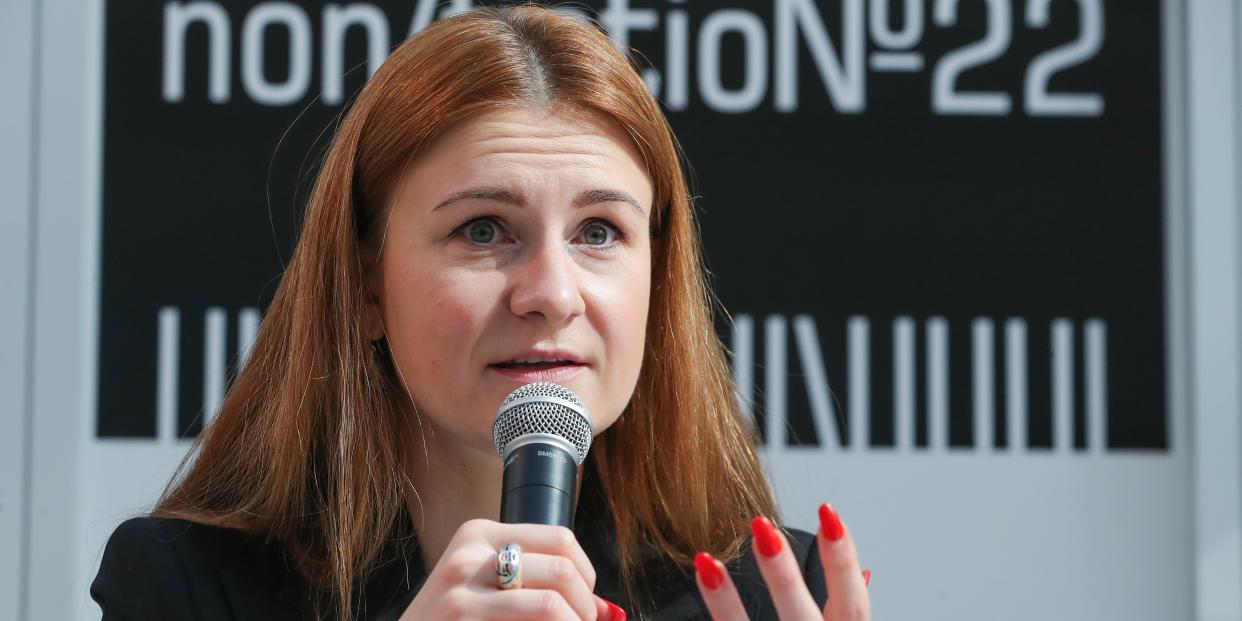A convicted Russian agent who was recently freed from US prison says her new seat in Russia's parliament is 'not a reward'

A convicted Russian agent who was jailed in the US denied her new seat in Russia's parliament is a gift.
"It's not a reward," Maria Butina told NYT. "I wasn't a spy. I wasn't working for the government. I was just a civilian."
Butina pleaded guilty to one count of conspiracy in 2018 and admitted to acting as an unregistered foreign agent.
Maria Butina, a Russian national who pleaded guilty to conspiracy and acted as an unregistered foreign agent in the US, denied this week that her new seat in Russia's parliament is a gift.
"It's not a reward," Butina told the New York Times in a new interview. "I wasn't a spy. I wasn't working for the government. I was just a civilian."
"If I had known that I have to register to build peace between the two nations by my own initiative, I would have loved to," she added.
Butina in December 2018 admitted to acting as an unregistered agent of the Russian government and infiltrating the National Rifle Association (NRA) in an attempt to sway US policy in favor of Russia. An indictment returned against Butina in July of that year said she and a high-ranking Russian official, believed to be the Russian politician Alexander Torshin, worked to create a "back channel" between Russia and the US, using the NRA as a conduit.
"Butina sought to establish unofficial lines of communication with Americans having power and influence over US politics," her plea agreement said.
She admitted to drafting a proposal in Russian in March 2015 called the "Description of the Diplomacy Project," which implied that "Russia could use unofficial channels of communication" to build relationships with the Republican Party, referred to as "Political Party #1" in US court filings.
Butina also spent years cultivating ties with American gun-rights activists, like the Republican strategist Paul Erickson, with whom she has been acquainted since at least 2013. Among other things, prosecutors accused Butina of pursuing a sexual relationship with Erickson to make inroads with the NRA.
After serving 15 months in US prisons — a sentence that Russian President Vladimir Putin decried as an "outrage" — Butina was deported back to Russia in October 2019. Within roughly two months of her return, Butina was given a job as a host on the state-run media outlet RT.
Butina became a member of the Duma, Russia's parliament, for the Kirov region in October. The local governor gave up the seat so Butina could fill it.
She told the Times that she wants to use her new position to improve relations between the US and Russia. "I believed in the friendship between the two nations, and I still do believe in it," Butina said. "We can be friends, we must be."
But critics suggest that she was gifted the Duma seat as a reward for carrying out Putin's agenda to influence US politics.
In April, Butina made an unexpected visit to the Russian prison where the top Kremlin critic Alexei Navalny is being held. At the time, he was engaged in a weekslong hunger strike over demands for proper medical care. While those close to Navalny voiced concerns that he was on the brink of death, Butina downplayed his medical condition and filmed her visit to the prison in an effort to portray the conditions as better than those in US facilities.
Maria Pevchikh, the chief of the investigative unit of Navalny's organization, the Anti-Corruption Foundation, told The Times that Butina's Duma seat was a reward for her coverage of Navalny's imprisonment.
"If anything, this was a reward for what she did by visiting Navalny in prison, and that TV episode, which was highly embarrassing and disgusting," Pevchikh said. "Not many people would agree to do that. And she did."
Pevchikh said Butina is a "good trophy" for the ruling party because she talks "nonstop about how bad things in America are."
A message posted to Navalny's Telegram channel also described Butina as a "wretched propagandist" for the state-broadcaster RT, adding that she "yelled that this was the best and most comfortable prison."
Navalny was poisoned in Siberia in August 2020, which Putin has been widely accused of orchestrating. His imprisonment, which top rights groups say is politically motivated, led to mass protests in Russia and has been condemned by leaders across the globe.
Read the original article on Business Insider

 Yahoo News
Yahoo News 
